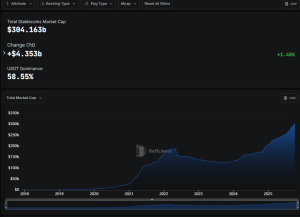Be a part of Our Telegram channel to remain updated on breaking information protection
Citigroup has invested in stablecoin infrastructure supplier BVNK by Citi Ventures, simply months after warning that the cryptos may drain deposits from conventional banks
BVNK’s platform serves as an onramp and offramp for patrons to maneuver cash between fiat and crypto. Additionally it is backed by US crypto trade Coinbase and fund supervisor Tiger World Administration.
The funding underscores TradFi’s shift from warning to participation within the stablecoin ecosystem after the US GENIUS Act supplied regulatory readability over their standing.
BVNK Valuation Exceeds $750 Million After Citi Funding
The firm has declined to reveal the quantity Citi invested or at what valuation. However co-founder Chris Harmse not too long ago confirmed that the funding has pushed its valuation effectively above the $750 million that was disclosed at its newest funding spherical.
BVNK at the moment finds itself in a aggressive market alongside newcomers equivalent to Alchemy Pay, TripleA and even the effectively established Ripple. All of those companies are vying to take the lion’s share of the cross-border digital cash market.
Amid the robust competitors, Harmse mentioned that BVNK has “dipped out and in of profitability” as the corporate invested in development, however mentioned the agency is experiencing momentum, particularly within the US.
The co-founder added that the US has been the corporate’’s strongest rising market previously 12-18 months. This development was spurred by the approval of the GENIUS stablecoin Act, which was signed into regulation earlier this 12 months by US President Donald Trump.
In August, US Treasury Secretary Scott Bessent expressed assist for stablecoin adoption, and mentioned these tokens “will broaden greenback entry for billions throughout the globe.”
Implementing the GENIUS Act is crucial to securing American management in digital belongings.
Stablecoins will broaden greenback entry for billions throughout the globe and result in a surge in demand for U.S. Treasuries, which again stablecoins.
It’s a win-win-win for everybody concerned:… https://t.co/p5nRQpBfnw
— Treasury Secretary Scott Bessent (@SecScottBessent) August 18, 2025
The regulatory readability supplied by the GENIUS Act has boosted the capitalization of the stablecoin market in current months, whereas a number of monetary establishments have since signaled plans to launch their very own stablecoins.
Previously week, the capitalization for the stablecoin sector surged round $4.353 billion, in keeping with DefiLlama knowledge.
Following the expansion previously seven days, the stablecoin market cap now stands at over $304.163 billion.

Stablecoin market cap (Supply: DefiLlama)
Previously thirty days alone, $5 trillion in stablecoin transactions have taken place as effectively, in keeping with on-chain analytics from Visa.
One of many companies that has confirmed stablecoin plans is Citi, whose CEO Jane Fraser mentioned in July, the identical month the GENIUS Act was signed into regulation, that the financial institution is contemplating issuing its personal stablecoin. She additionally mentioned that Citigroup is growing custodian companies for crypto belongings.
By way of these merchandise, Citi goals to ship “the advantages of developments in stablecoin and digital belongings” to its purchasers in a protected method by modernizing its personal infrastructure.
Different companies are additionally exploring blockchain know-how and tokenization. This contains Wall Road large JPMorgan Chase, which has launched its personal stablecoin-like token referred to as JPMD. In the meantime, Financial institution of New York Mellon has mentioned that it’s testing tokenized deposits. HSBC has launched its personal tokenized deposit service as effectively.
Citi Had Warned Of Deposit Flight Danger Comparable To The Nineteen Eighties
Citi’s funding in BVNK comes after considered one of its analyst, Ronit Ghose, warned in August {that a} rising curiosity in stablecoin funds presents deposit flight danger for conventional banks, much like what was seen within the Nineteen Eighties when cash market funds ballooned from $4 billion to $235 billion in seven years.
Main banking teams within the US have already expressed their considerations round yield-bearing stablecoins, and have lobbied for Congress to shut what they referred to as a “loophole” within the GENIUS Act.
The act prohibits stablecoin issuers from providing yields on to token holders, however doesn’t prolong this ban to 3rd events or associates. This, in keeping with the banking teams, opens the door for stablecoin issuers to bypass the restrictions. For instance, Coinbase at the moment provides its customers yields on Circle’s USD Coin (USDC) stablecoin.
If that “loophole” stays unaddressed, the banking teams predicted that it may end in as much as $6.6 trillion in deposit outflows from the standard banking system. This might then essentially alter how banks fund loans.
Nonetheless, the crypto business has pushed again towards the banking teams’ claims, with many dismissing them as simply an effort by banks to forestall competitors. Some, together with Stripe CEO Patrick Collison, have additionally mentioned that stablecoins will now pressure banks to supply larger yields to clients.
Good put up on evolving stablecoin market construction. I might prolong it additional: sure, I feel that stablecoin issuers are going to need to share yield with others, however this is only one occasion. Everybody goes to need to share yield. Right now, the typical curiosity on US financial savings… https://t.co/yjjLOzxoOk
— Patrick Collison (@patrickc) October 3, 2025
Associated Articles:
Greatest Pockets – Diversify Your Crypto Portfolio
Simple to Use, Characteristic-Pushed Crypto Pockets
Get Early Entry to Upcoming Token ICOs
Multi-Chain, Multi-Pockets, Non-Custodial
Now On App Retailer, Google Play
Stake To Earn Native Token $BEST
250,000+ Month-to-month Energetic Customers
Be a part of Our Telegram channel to remain updated on breaking information protection









